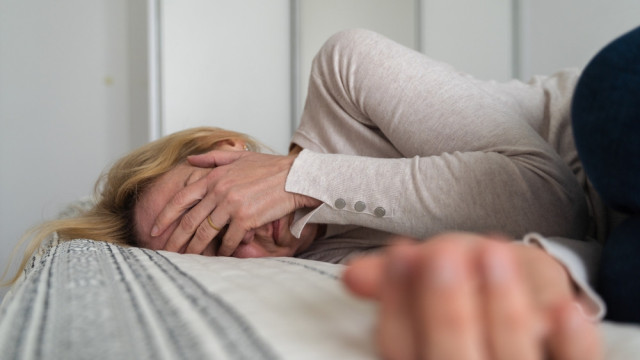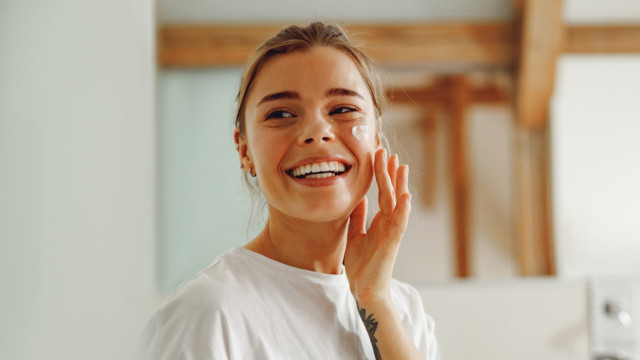





























See Also
See Again
© Shutterstock
0 / 30 Fotos
Spring allergies
- Spring allergies are triggered by pollen from trees, grass, and flowers. When inhaled, pollen causes the immune system to overreact, releasing histamines that lead to sneezing, congestion, and itchy eyes.
© Shutterstock
1 / 30 Fotos
Knowing your triggers
- Knowing what triggers your allergies can help you take the right precautions. Allergy season typically peaks in early spring but can last through summer, making proactive management essential for relief.
© Shutterstock
2 / 30 Fotos
Check the pollen forecast daily
- Just like checking the weather, monitoring pollen levels can help you plan your day. Many weather apps and allergy websites provide real-time pollen counts. If levels are high, limit outdoor activities.
© Shutterstock
3 / 30 Fotos
Take advantage of low pollen days
- On days with lower pollen counts, or after it rains, enjoy the fresh air without worrying about sneezing. Staying informed helps manage allergy symptoms and lets you fully embrace the outdoors.
© Shutterstock
4 / 30 Fotos
Keep windows closed
- Fresh spring air is tempting, but open windows allow pollen to enter your home, triggering allergies indoors. Instead, use an air conditioner with a clean filter to keep indoor air fresh without allergens.
© Shutterstock
5 / 30 Fotos
Pollen filter
- If you need ventilation, opt for window screens with pollen filters. This simple step can significantly reduce pollen exposure and keep your home a sneeze-free zone during allergy season.
© Shutterstock
6 / 30 Fotos
Change clothes after going outside
- Pollen clings to your clothes, hair, and skin, so it follows you inside. To minimize exposure, change into fresh clothes as soon as you return home.
© Shutterstock
7 / 30 Fotos
A shower does the trick
- Taking a quick shower removes any lingering pollen from your body, preventing it from transferring to furniture and bedding. This routine can be especially helpful before bedtime, ensuring you don’t bring allergens into the space where you sleep.
© Shutterstock
8 / 30 Fotos
Use a HEPA air purifier indoors
- High-Efficiency Particulate Air (HEPA) filters trap airborne allergens, including pollen, dust, and pet dander. Placing one in your bedroom or main living area can help purify indoor air and reduce allergy flare-ups.
© Shutterstock
9 / 30 Fotos
Make sure to clean or replace the filter
- Regularly replacing HVAC filters and vacuuming with a HEPA-filtered vacuum cleaner further improves air quality, making your home a safe haven from seasonal allergens.
© Shutterstock
10 / 30 Fotos
Protect yourself when you're out
- Wearing sunglasses and a hat can help shield your eyes and hair from pollen. Wraparound sunglasses are especially useful in preventing airborne allergens from irritating your eyes. A hat keeps pollen from settling in your hair, which could later transfer to your pillow.
© Shutterstock
11 / 30 Fotos
It can reduce discomfort
- These small protective measures can significantly reduce the discomfort of itchy, watery eyes during peak allergy season.
© Shutterstock
12 / 30 Fotos
Try nasal irrigation for quick relief
- A neti pot or saline spray helps rinse pollen and allergens from your nasal passages, reducing congestion and irritation. This simple practice flushes out allergens before they can trigger a strong reaction.
© Shutterstock
13 / 30 Fotos
Safe nasal irrigation practices
- Be sure to use sterile, distilled, or boiled water to avoid infections. Doing this once or twice daily, especially after spending time outdoors, can offer natural and effective allergy relief.
© Shutterstock
14 / 30 Fotos
Take allergy medications early
- Antihistamines, decongestants, and nasal sprays work best when taken before symptoms fully develop. If you know allergy season is coming, start your medication regimen early.
© Shutterstock
15 / 30 Fotos
Managing allergies with medication
- Non-drowsy antihistamines can keep symptoms at bay. If allergies are severe, consult a doctor for prescription treatments or allergy shots to help build long-term immunity against specific allergens.
© Shutterstock
16 / 30 Fotos
Keep your car pollen-free
- Driving with windows down allows pollen to accumulate inside your car, triggering allergy symptoms even when you're on the go. Instead, use the air conditioning.
© Shutterstock
17 / 30 Fotos
Allergy-free car
- Wipe down interior surfaces regularly and consider using a cabin air filter designed to trap pollen and dust, making your car a comfortable allergy-free zone.
© Shutterstock
18 / 30 Fotos
Avoid outdoor activities in the morning
- Pollen levels are usually highest between 5 am and 10 am. If you enjoy jogging, gardening, or walking, try scheduling them later in the afternoon or evening when pollen counts drop.
© Shutterstock
19 / 30 Fotos
A facemask can help
- If you must be outdoors during peak hours, wearing a face mask can help reduce direct pollen exposure and keep symptoms under control while still enjoying the fresh air.
© Shutterstock
20 / 30 Fotos
Choose allergy-friendly landscaping
- If you love gardening but suffer from allergies, opt for low-pollen plants like roses, tulips, and daffodils instead of high-pollen trees and grasses. Avoid wind-pollinated plants like ragweed and birch trees, which release large amounts of airborne pollen.
© Shutterstock
21 / 30 Fotos
Creating an allergy-friendly garden
- Keeping grass trimmed short and using mulch to cover the soil can help minimize pollen spread in your yard, making it a more allergy-friendly space.
© Shutterstock
22 / 30 Fotos
Wash bedding and fabrics frequently
- Pollen settles on sheets, pillowcases, and clothing, so washing them weekly in hot water removes allergens and improves sleep quality. Use a dryer instead of line-drying clothes outside, as hanging laundry outdoors can allow pollen to stick to fabrics.
© Shutterstock
23 / 30 Fotos
Allergen-free sleep
- Hypoallergenic pillow covers and mattress protectors add an extra layer of defense against allergens, keeping your sleeping environment as allergen-free as possible.
© Shutterstock
24 / 30 Fotos
Is filtered water really better than tap?
- Drinking plenty of water, herbal teas, and clear broths helps keep mucus thin, making it easier to clear allergens from your nasal passages. Dehydration can thicken mucus, worsening congestion and irritation.
© Getty Images
25 / 30 Fotos
Opt for warm drinks
- Warm drinks, such as ginger or chamomile tea, can soothe the throat and reduce inflammation. Staying well-hydrated is a simple yet effective way to help your body flush out allergens more efficiently.
© Shutterstock
26 / 30 Fotos
Allergy shots for long-term relief
- If seasonal allergies significantly impact your life, immunotherapy (allergy shots) can be a long-term solution. These shots gradually expose your body to allergens, helping your immune system build tolerance over time.
© Shutterstock
27 / 30 Fotos
Immunotherapy
- Studies show that immunotherapy can significantly reduce allergy symptoms and even prevent new allergies from developing.
© Shutterstock
28 / 30 Fotos
When to see a doctor
- If OTC meds and home remedies fail, see an allergist. They can test for allergens and recommend stronger treatments, like prescription sprays or antihistamines, ensuring effective allergy management for a comfortable spring. Sources: (Healthline) (Cleveland Clinic) See also: Sinus infection, cold, or allergies: how to tell the difference?
© Shutterstock
29 / 30 Fotos
© Shutterstock
0 / 30 Fotos
Spring allergies
- Spring allergies are triggered by pollen from trees, grass, and flowers. When inhaled, pollen causes the immune system to overreact, releasing histamines that lead to sneezing, congestion, and itchy eyes.
© Shutterstock
1 / 30 Fotos
Knowing your triggers
- Knowing what triggers your allergies can help you take the right precautions. Allergy season typically peaks in early spring but can last through summer, making proactive management essential for relief.
© Shutterstock
2 / 30 Fotos
Check the pollen forecast daily
- Just like checking the weather, monitoring pollen levels can help you plan your day. Many weather apps and allergy websites provide real-time pollen counts. If levels are high, limit outdoor activities.
© Shutterstock
3 / 30 Fotos
Take advantage of low pollen days
- On days with lower pollen counts, or after it rains, enjoy the fresh air without worrying about sneezing. Staying informed helps manage allergy symptoms and lets you fully embrace the outdoors.
© Shutterstock
4 / 30 Fotos
Keep windows closed
- Fresh spring air is tempting, but open windows allow pollen to enter your home, triggering allergies indoors. Instead, use an air conditioner with a clean filter to keep indoor air fresh without allergens.
© Shutterstock
5 / 30 Fotos
Pollen filter
- If you need ventilation, opt for window screens with pollen filters. This simple step can significantly reduce pollen exposure and keep your home a sneeze-free zone during allergy season.
© Shutterstock
6 / 30 Fotos
Change clothes after going outside
- Pollen clings to your clothes, hair, and skin, so it follows you inside. To minimize exposure, change into fresh clothes as soon as you return home.
© Shutterstock
7 / 30 Fotos
A shower does the trick
- Taking a quick shower removes any lingering pollen from your body, preventing it from transferring to furniture and bedding. This routine can be especially helpful before bedtime, ensuring you don’t bring allergens into the space where you sleep.
© Shutterstock
8 / 30 Fotos
Use a HEPA air purifier indoors
- High-Efficiency Particulate Air (HEPA) filters trap airborne allergens, including pollen, dust, and pet dander. Placing one in your bedroom or main living area can help purify indoor air and reduce allergy flare-ups.
© Shutterstock
9 / 30 Fotos
Make sure to clean or replace the filter
- Regularly replacing HVAC filters and vacuuming with a HEPA-filtered vacuum cleaner further improves air quality, making your home a safe haven from seasonal allergens.
© Shutterstock
10 / 30 Fotos
Protect yourself when you're out
- Wearing sunglasses and a hat can help shield your eyes and hair from pollen. Wraparound sunglasses are especially useful in preventing airborne allergens from irritating your eyes. A hat keeps pollen from settling in your hair, which could later transfer to your pillow.
© Shutterstock
11 / 30 Fotos
It can reduce discomfort
- These small protective measures can significantly reduce the discomfort of itchy, watery eyes during peak allergy season.
© Shutterstock
12 / 30 Fotos
Try nasal irrigation for quick relief
- A neti pot or saline spray helps rinse pollen and allergens from your nasal passages, reducing congestion and irritation. This simple practice flushes out allergens before they can trigger a strong reaction.
© Shutterstock
13 / 30 Fotos
Safe nasal irrigation practices
- Be sure to use sterile, distilled, or boiled water to avoid infections. Doing this once or twice daily, especially after spending time outdoors, can offer natural and effective allergy relief.
© Shutterstock
14 / 30 Fotos
Take allergy medications early
- Antihistamines, decongestants, and nasal sprays work best when taken before symptoms fully develop. If you know allergy season is coming, start your medication regimen early.
© Shutterstock
15 / 30 Fotos
Managing allergies with medication
- Non-drowsy antihistamines can keep symptoms at bay. If allergies are severe, consult a doctor for prescription treatments or allergy shots to help build long-term immunity against specific allergens.
© Shutterstock
16 / 30 Fotos
Keep your car pollen-free
- Driving with windows down allows pollen to accumulate inside your car, triggering allergy symptoms even when you're on the go. Instead, use the air conditioning.
© Shutterstock
17 / 30 Fotos
Allergy-free car
- Wipe down interior surfaces regularly and consider using a cabin air filter designed to trap pollen and dust, making your car a comfortable allergy-free zone.
© Shutterstock
18 / 30 Fotos
Avoid outdoor activities in the morning
- Pollen levels are usually highest between 5 am and 10 am. If you enjoy jogging, gardening, or walking, try scheduling them later in the afternoon or evening when pollen counts drop.
© Shutterstock
19 / 30 Fotos
A facemask can help
- If you must be outdoors during peak hours, wearing a face mask can help reduce direct pollen exposure and keep symptoms under control while still enjoying the fresh air.
© Shutterstock
20 / 30 Fotos
Choose allergy-friendly landscaping
- If you love gardening but suffer from allergies, opt for low-pollen plants like roses, tulips, and daffodils instead of high-pollen trees and grasses. Avoid wind-pollinated plants like ragweed and birch trees, which release large amounts of airborne pollen.
© Shutterstock
21 / 30 Fotos
Creating an allergy-friendly garden
- Keeping grass trimmed short and using mulch to cover the soil can help minimize pollen spread in your yard, making it a more allergy-friendly space.
© Shutterstock
22 / 30 Fotos
Wash bedding and fabrics frequently
- Pollen settles on sheets, pillowcases, and clothing, so washing them weekly in hot water removes allergens and improves sleep quality. Use a dryer instead of line-drying clothes outside, as hanging laundry outdoors can allow pollen to stick to fabrics.
© Shutterstock
23 / 30 Fotos
Allergen-free sleep
- Hypoallergenic pillow covers and mattress protectors add an extra layer of defense against allergens, keeping your sleeping environment as allergen-free as possible.
© Shutterstock
24 / 30 Fotos
Is filtered water really better than tap?
- Drinking plenty of water, herbal teas, and clear broths helps keep mucus thin, making it easier to clear allergens from your nasal passages. Dehydration can thicken mucus, worsening congestion and irritation.
© Getty Images
25 / 30 Fotos
Opt for warm drinks
- Warm drinks, such as ginger or chamomile tea, can soothe the throat and reduce inflammation. Staying well-hydrated is a simple yet effective way to help your body flush out allergens more efficiently.
© Shutterstock
26 / 30 Fotos
Allergy shots for long-term relief
- If seasonal allergies significantly impact your life, immunotherapy (allergy shots) can be a long-term solution. These shots gradually expose your body to allergens, helping your immune system build tolerance over time.
© Shutterstock
27 / 30 Fotos
Immunotherapy
- Studies show that immunotherapy can significantly reduce allergy symptoms and even prevent new allergies from developing.
© Shutterstock
28 / 30 Fotos
When to see a doctor
- If OTC meds and home remedies fail, see an allergist. They can test for allergens and recommend stronger treatments, like prescription sprays or antihistamines, ensuring effective allergy management for a comfortable spring. Sources: (Healthline) (Cleveland Clinic) See also: Sinus infection, cold, or allergies: how to tell the difference?
© Shutterstock
29 / 30 Fotos
Allergy survival guide: how to enjoy spring without sneezing
Spring is here! Soothe your allergies with these simple tips
© Shutterstock
Spring is beautiful, but for allergy sufferers, it can mean nonstop sneezing, itchy eyes, and congestion. As trees bloom and pollen fills the air, managing symptoms becomes essential if you want to enjoy the season. Thankfully, with the right strategies, you can minimize exposure to allergens and find effective relief.
From medication options to lifestyle adjustments, click through and find out how to navigate allergy season with ease.
RECOMMENDED FOR YOU

































MOST READ
- Last Hour
- Last Day
- Last Week








